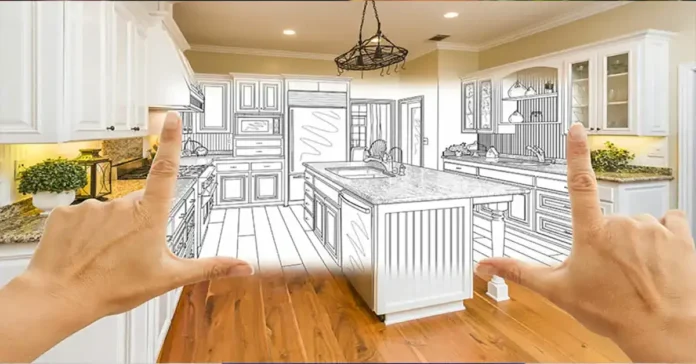If you’re renovating a small space or tackling a full home makeover, proper planning is key to achieving your desired results. With the help of this comprehensive guide on home renovation planning, we can understand the important tips and strategies. The first step is downsizing and decluttering. Clearing out the unnecessary items not only created the space but also provide a more organised and functional living environment.
Consider using box storage solutions and utility lockers to store items efficiently during the renovation process, keeping your space clutter-free and accessible. Divide the areas of your home that require attention and prioritize tasks based on importance and feasibility. Factor in costs for materials, labor, and unexpected expenses to avoid budget overruns.
Design considerations play a significant role in home renovations. Whether you’re updating the kitchen, revamping the bathroom, or enhancing living spaces, choose designs that reflect your style and meet your practical needs. Explore space-saving solutions like built-in storage, multipurpose furniture, and smart layouts to maximize functionality without compromising aesthetics.
By following these tips and strategies, you’ll be well-equipped to navigate the complexities of home renovation planning with confidence. Stay organized, stay focused, and watch your dream home come to life!
Home Renovation Planning – Requirements
When diving into home renovation planning, several key requirements set the foundation for a successful project. First, assess your needs and goals, identifying areas of improvement and functionality enhancements. Next, establish a realistic budget that covers all aspects of the renovation, including materials, labor, and unforeseen costs. Consider obtaining necessary permits and approvals, ensuring compliance with local regulations.
Additionally, prioritize sustainability by choosing eco-friendly materials and energy-efficient solutions. Plan for adequate storage solutions, such as box storage or utility lockers, to keep your space organized during the renovation process. Lastly, collaborate with experienced professionals, including architects, contractors, and designers, to bring your vision to life effectively and efficiently.
1. Detailed Home Renovation Project Planning
You should plan carefully before embarking on a home renovation project. You should always think about how an idea might turn out before throwing it into a project. You should first make a detailed plan for your undertaking before you start. Then you can be certain that everything will fit together correctly.
You can find methods for creating an interior design that is stunning. If you are looking to get inspired, looking outside the window can be a good place to start. You may also want use tools like mood boards and mind maps to help structure your thoughts and ideas.
You will need to consider more factors when planning your house. For example, you should ensure that your design is functional.
2. Set a Project Budget
You must first determine the amount of money you can afford before commencing construction. It will help you avoid overspending and ensure you do not get yourself into financial trouble during construction of your home. You can track exactly how much money you are putting into the project, allowing you to make better decisions during the entire process.
You should always ask for a quote from a contractor before hiring them. You will need to factor in the cost associated with materials such as lumber, wallboard, and paint plus labour when determining the budget for your project.
You can save money if you price out materials yourself. To avoid paying for things you already have; you will need to create a list of everything you own. You will know exactly what you are paying for and whether you are getting a good deal.
Planning ahead with a renovation plan can help avoid costly mistakes and delays.
3. Hire Contractors
When hiring a contractor, it is important to ask questions about their experience, qualifications, and references. You do not want to end up with a subpar job because you did not do your homework. Here are some things to consider:
- Ask how long they have been working in construction. Make sure you check out their background.
- Be wary of contractors who want payment upfront. This could mean they are not serious about completing the job. Instead, look for those who offer discounts for paying in instalments.
- Make sure the contractor has the required tools and equipment. A good contractor will provide everything you need.
- Look for a contractor who offers warranties. This way, if something goes wrong, you will have recourse.
- Check the contractor’s references. In India, this is by far the most crucial step. Do not hesitate to call previous clients. They can give an insight into the contractor’s work ethic and professionalism.
4. Build a Timeline
When you are planning a big project, it helps to have a timeline. A timeline allows you to plan out what needs to happen next, and how long each task takes. This way, you know exactly where you stand, and you do not waste time working on something that is not moving forward.
Start by creating a list of everything that needs to be done. Then break down those tasks into smaller pieces. For example, if you are building a house, you might make one section for framing the walls, another for installing drywall, and another for painting. Each step is broken down into specific dates. You will want to add notes about why certain things take longer than others. If you are doing a lot of work around the house, you might note that some projects require special tools or materials.
Once you have got your timeline set up, you can move onto the next steps. You will still need to check off items as they go along, but now you will not forget anything important.
5. Pack Up and Prepare for Your Home Renovation
Moving out early will help you avoid costly mistakes during your home renovation project. You do not want to spend extra money on materials or labour because you did not plan. Here are some tips to make sure you get everything done on schedule without spending too much money.
- Plan Ahead
Start planning well in advance so that you can take advantage of seasonal deals and discounts. If you start shopping around six months prior to your planned date of completion, you will find better prices and will not miss exceptional discounts and sales.
- Get Organized
Make sure you have adequate space in a self storage facility to store your belongings throughout the duration of your project. Use Self Storage India’s handy storage calculator to find out how much space your belongings will need. Move boxes into designated areas and label each box with the contents inside. This will allow you to quickly locate what you are looking for later.
- Keep Track of Materials
Keep track of your inventory list to ensure that you do not run out of anything. Use a spreadsheet or online tool to keep track of your materials and costs.
There are many ways to approach a renovation. Some people prefer to go step-by-step, starting with the smaller projects. Others take a comprehensive approach, assessing their overall goals before embarking on anything specific. Whatever method you choose, consider these key details. They will ensure you get the best out of your project.
Final Words on Home Renovation Planning
In conclusion, effective home renovation planning is a multi-faceted process that encompasses several crucial elements. By addressing key requirements such as assessing needs and goals, setting a realistic budget, obtaining necessary permits, and prioritizing sustainability, you lay a solid foundation for a successful project.
Adequate storage solutions play a vital role in keeping your space organized and functional throughout the renovation journey. Collaboration with experienced professionals ensures that your vision is translated into tangible results, while compliance with local regulations ensures a smooth and hassle-free process.
By following these pointers and staying organized and focused, you can navigate the complexities of home renovation planning with confidence.
FAQs
A: Home renovation planning involves creating a detailed roadmap for improving and upgrading your living space, considering factors like budget, design preferences, and project timelines.
A: Planning is crucial as it helps you set clear goals, allocate resources efficiently, and avoid unexpected challenges during the renovation process.
A: Begin by identifying your renovation goals, creating a budget, researching design ideas, and consulting with professionals like architects or contractors.
A: Consider factors such as your budget, desired renovation scope, necessary permits, timeline, and hiring reputable contractors or tradespeople.
A: Popular trends include open-concept layouts, energy-efficient upgrades, smart home technology integration, and sustainable materials usage.
A: The duration of a renovation project varies based on its complexity and scope. It can range from a few weeks for minor upgrades to several months for major renovations.
A: You can estimate costs by getting quotes from contractors, researching material prices, and accounting for additional expenses like permits and unforeseen repairs.
A: To ensure success, communicate clearly with your contractors, stay flexible, plan for contingencies, and conduct regular inspections throughout the renovation process.
A: Stay calm, consult with your contractor or project manager, evaluate the options available, and adjust your plans accordingly to minimize delays and additional costs.
A: While DIY projects are possible for certain tasks, complex renovations often require professional expertise. Consider your skills, safety, and local building regulations before deciding.








